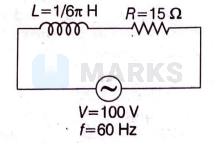Search any question & find its solution
Question:
Answered & Verified by Expert
A circuit containing inductance of $\frac{1}{6 \pi} \mathrm{H}$ and a resistance of $15 \Omega$ in series. If an $A C$ voltage of $100 \mathrm{~V}$ and $60 \mathrm{~Hz}$ is applied to above circuit, then the current in the circuit and phase difference between voltage and current respectively are
Options:
Solution:
2426 Upvotes
Verified Answer
The correct answer is:
$4 \mathrm{~A}$ and $\tan ^{-1}\left(\frac{4}{3}\right)$
Circuit given is,

Inductive reactance of circuit,
$$
\begin{aligned}
& X_L=L \omega=L .2 \pi f \\
\Rightarrow \quad & X_L=\frac{1}{6 \pi} \times 2 \pi \times 60 \Rightarrow X_L=20 \Omega .
\end{aligned}
$$
Impedence of circuit,
$$
\begin{aligned}
Z & =\sqrt{X_L^2+R^2}=\sqrt{(20)^2+(15)^2} \\
& =\sqrt{625}=25 \Omega
\end{aligned}
$$
Current in circuit, $I=\frac{V}{Z}=\frac{100}{25}=4 \mathrm{~A}$
Phase difference $\phi$ between voltage and current is given by $\tan \phi=\frac{X_L}{R}=\frac{20}{15}$
$$
\Rightarrow \quad \phi=\tan ^{-1}\left(\frac{4}{3}\right)
$$

Inductive reactance of circuit,
$$
\begin{aligned}
& X_L=L \omega=L .2 \pi f \\
\Rightarrow \quad & X_L=\frac{1}{6 \pi} \times 2 \pi \times 60 \Rightarrow X_L=20 \Omega .
\end{aligned}
$$
Impedence of circuit,
$$
\begin{aligned}
Z & =\sqrt{X_L^2+R^2}=\sqrt{(20)^2+(15)^2} \\
& =\sqrt{625}=25 \Omega
\end{aligned}
$$
Current in circuit, $I=\frac{V}{Z}=\frac{100}{25}=4 \mathrm{~A}$
Phase difference $\phi$ between voltage and current is given by $\tan \phi=\frac{X_L}{R}=\frac{20}{15}$
$$
\Rightarrow \quad \phi=\tan ^{-1}\left(\frac{4}{3}\right)
$$
Looking for more such questions to practice?
Download the MARKS App - The ultimate prep app for IIT JEE & NEET with chapter-wise PYQs, revision notes, formula sheets, custom tests & much more.